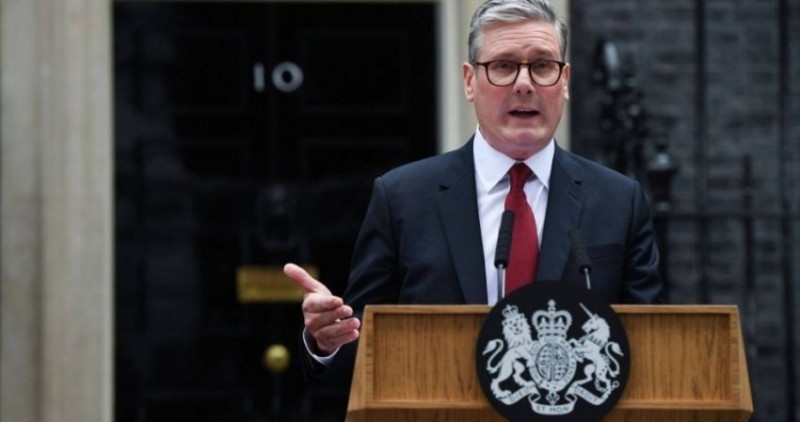
LONDON: British Prime Minister Keir Starmer is set to convene an emergency meeting with police leaders on Monday following a surge in violent anti-immigration protests. The unrest has seen buildings and vehicles set ablaze, with hotels housing asylum seekers becoming targets.
The riots have spread across various towns and cities over the past week after a tragic knife attack in Southport, northwest England, resulted in the deaths of three girls. To date, 420 people have been arrested in connection with the violence.
Anti-immigrant and anti-Muslim groups have exploited the situation, spreading false claims online that the suspect was a radical Islamist who had recently arrived in the UK. However, police have clarified that the suspect was born in Britain and the incident is not being treated as terrorism.
Interior Minister Yvette Cooper criticized the rioters, stating they had been "emboldened by this moment to stir up racial hatred." Reports indicate that rioters have thrown bricks at police, looted shops, and attacked mosques and businesses owned by Asians.
Riots erupted over the weekend in cities including Liverpool, Bristol, Tamworth, Middlesbrough, and Belfast. Many of the rioters, often young men wearing balaclavas and draped in British flags, chanted "Stop the Boats," a slogan referring to recent migrant arrivals.
In Rotherham, northern England, protesters attempted to break into a hotel housing asylum seekers. Police have attributed the escalating violence to online disinformation spread by high-profile individuals, including Stephen Yaxley-Lennon, known as Tommy Robinson. Yaxley-Lennon has been accused of spreading false information to his 875,000 followers on X (formerly Twitter).
Elon Musk, owner of X, has also commented on the unrest, suggesting that civil war could be an inevitable outcome in response to mass migration and open borders.
On Saturday, unrest was reported in Hull, Liverpool, Bristol, Manchester, Stoke-on-Trent, Blackpool, and Belfast. The violence included the throwing of missiles, looting, and assaults on police. In Liverpool, protesters clashed with counter-protesters, resulting in injuries and further property damage.
The violence continued on Sunday in Rotherham, Middlesbrough, and Bolton. Prime Minister Starmer condemned the riots in a televised statement and emphasized the need for calm. More than 150 people have been arrested since Saturday.
Suspects under 18 are typically not named publicly. However, a judge has ruled that Axel Rudakubana, who was born in Wales to Rwandan parents, should be identified. This decision aims to curb the spread of misinformation surrounding his case. Rudakubana faces three charges of murder and ten charges of attempted murder.
The recent unrest has led to hundreds of arrests, with more expected as authorities review CCTV, social media, and body camera footage. Police have cautioned that, despite extensive security measures and the deployment of thousands of officers, some crimes may not receive thorough investigation.
The high volume of arrests presents a significant challenge for the courts, which are already struggling with a backlog of cases due to years of austerity and the COVID-19 pandemic. In May, the National Audit Office reported a backlog of over 60,000 cases. Additionally, the government recently announced that thousands of prisoners may be released early to alleviate overcrowding in prisons.